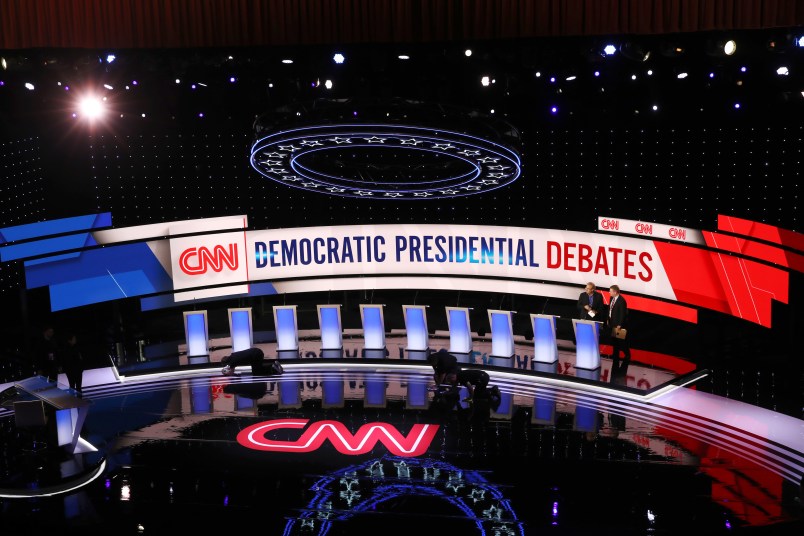On Wednesday, another 10 candidates will take the stage after their peers battled it out over health care policy, taxes and electability for nearly three hours on night one of the debates.
Here are three things to look out for:
The Biden/Harris/Booker dynamic
Sen. Kamala Harris’ (D-CA) shots at former Vice President Joe Biden over his stance on busing was the most memorable exchange of the first round of debates and gave her campaign at least a temporary boost. Sen. Cory Booker (D-NJ) quickly caught on, launching himself into the headlines by dredging up Biden’s old stances on race-based issues that align less well with the modern Democratic Party than that of his early career.
This time around, you can bet that the two of them will try to land more punches on Biden to achieve that elusive breakout moment from a packed debate stage.
Biden, for his part, has promised to be less “polite” in round two, and will almost certainly be better prepared than last time, when Harris caught him completely flat-footed.
The pit bulls
For Sen. Kirsten Gillibrand (D-NY), New York Mayor Bill de Blasio and former HUD Secretary Julián Castro, the name of the first debate was aggression, though they expressed it in different ways.
Gillibrand and de Blasio were interrupters. Banished to the flanks of the stage, they spoke up early and often to break into other candidates’ time, or to impose themselves with a followup response, even when it wasn’t their turn. They were clearly worried that their flailing campaigns would collapse altogether without a breakout moment during the night and were determined to snatch one, even if the moderators had a different plan.
And, as seen in former Rep. John Delaney’s (D-MD) performance on the first night of the debates this week, it’s not a bad strategy. Delaney got what felt like an inordinate amount of airtime, launching himself into multiple exchanges with top-tier candidates, all thanks to his own chutzpah.
Castro’s aggression, on the other hand, was directed at his peers — namely, former Rep. Beto O’Rourke (D-TX). O’Rourke made for a natural enemy as the two are Texans who want and need to own the immigration question. Castro accused O’Rourke of “not doing his homework,” a jab his brother reprised when O’Rourke spoke on the issue in the second round. We’ll watch where Castro aims his fire this time while deprived of a natural foil.
The feud?
Sen. Michael Bennet (D-CO) and tech entrepreneur Andrew Yang have infused the pre-debate atmosphere with some levity, taking to Twitter to tease each other with gif-heavy threats of a debate showdown.
Yang started the back and forth:
I would like to signal to the press that I will be attacking Michael Bennet at next week’s debate. Sorry @MichaelBennet but you know what you did.
— Andrew Yang (@AndrewYang) July 26, 2019
Bennet quickly responded:
Andrew, how did you know I got a C in precalculus in high school — on the retake. https://t.co/3ZdlC0PnLx
— Michael Bennet (@MichaelBennet) July 26, 2019
It literally snowballed from there:
Just confirmed with debate officials that @AndrewYang’s microphone will be muted during my rebuttal. https://t.co/YmR7HvkfRF pic.twitter.com/oT3Pe9shai
— Michael Bennet (@MichaelBennet) July 26, 2019
The tweets have been liked thousands of times, with some commenters thanking the two for bringing some laughter to a tense and competitive process.



